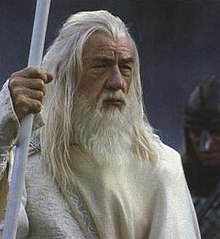In J.R.R. Tolkien's masterpiece, The Fellowship of the Ring, the titular fellowship arrives with its nine members at the Gates of Moria, the old entrance to the ancient dwarf kingdom long since abandoned. The fellowship are in desperate straits, their first attempt to move forward with the quest of destroying the One Ring had been defeated soundly when a blizzard closed the mountain pass. Now, with wolves approaching they find themselves facing a locked door. Gandalf purposes to lead them under the mountain to the other side, but the way forward is blocked. Unless Gandalf can decode the door's cryptic message, "Speak friend, and enter" by recalling the password that will open the magically sealed doors, this entire mission may end in failure before it accomplishes anything.
As the scene unfolds, Gandalf tries potential solutions in great number, all end in failure. Despite all his wisdom and skill, nothing works. That is until someone with a lot less wisdom and skill, the hobbit Merry, realizes that they had the answer all along. The door's message should have been translated, "Speak 'friend', and enter." As soon as Gandalf spoke the Elvish word for friend, the doors came open. The mystery of the sealed doors was really no mystery at all, the answer was written in plain sight.
As the Easter narrative begins in Mark's Gospel, we see Mary Magdalene, Mary the mother of James, and Salome on their way to the tomb to honor Jesus by further preparing his body for its final burial place. Having come very early in the morning, after a Sabbath when few of Jesus' followers could have known any peace following his horrific murder on a Cross, the women don't realize until they reach the garden that they don't have a plan to remove the large stone from the tomb's entrance. Thus, "Who will roll the stone away from the entrance of the tomb?" is a question that needs an answer, one the women don't have. Or so it seems to them.
In reality, God had already moved the stone, the tomb of Jesus had already been transformed from a place of sorrow, into history's most incredible victory monument. There was nothing wrong with the women being concerned about the stone, it was a legitimate obstacle from their point-of-view, but keeping with the pattern found in the scripture's of God's will and purpose being in motion whether his people are aware of it or not, God had answered their question before they even asked it.
We sometimes forget this, or at least don't act like we know it, but God has already answered all of life's most important questions for us. There are no riddles left for us to solve before we can move forward, when Jesus rose from the grave, the question, "What is the meaning of life?" had a full and powerful answer. So too did, "How am I supposed to live my life?" and "What happens to us when we die?" God has not called us to serve a cause that we can hope might succeed, but one in which the victory has already been secured, no need for us to worry about rolling away the stone.



